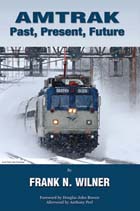Happening Now
Throughout American passenger train history, a theme emerges
December 11, 2012
Written By Malcolm Kenton

I just finished reading Frank Wilner’s new book, Amtrak: Past, Present, Future, a thorough account of the national passenger railroad’s origins and turbulent history. The more one studies the story of passenger trains in America in the latter half of the 20th century and into the 21st, the more the same theme repeats itself. Passenger trains have always had enough popular and political support to avoid extinction, but have never won enough resources to truly modernize and expand and to compete on a more level playing field with auto and air travel.
Ever since the idea of what became Amtrak was first floated, some have held on to the fantasy that Amtrak could be self-sufficient—in the absence of robust government investment in passenger train equipment and infrastructure—if only it was properly organized and given incentives to do so. But, as Wilner and many of the Amtrak veterans and experts he quotes make clear, organization is not the problem. Amtrak, no matter how it’s organized, will never be completely without reliance on public investment. That Amtrak continues to operate without being able to make long-term plans, without a clear vision for the future, and with continued government largesse towards competing modes that goes largely unquestioned, is a testament to the public’s desire for trains and hints at how much Americans’ travel choices would improve if the deck wasn’t in many ways stacked against trains.
Those who cling to the idea that Amtrak can be made self-sufficient miss the larger point: that transportation networks, for the most part, don’t exist primarily to make money for their own investors, but to serve as part of the entire economy’s life-support system, making it possible for all of us to reap rewards from a system in which we invest as taxpayers.
A few particularly well-stated quotes and excerpts from the book:
[A]nnually, Amtrak lives much like a family below the poverty level, scrimping here, patching there and hoping for better days. / How can this be when Amtrak provides an essential public good worthy of consistent and predictable funding to assure world-class service? / Indeed, the debate should not be whether America ought to have a national intercity rail passenger network; but rather how Amtrak is to obtain a consistent and predictable source of funding. – Wilner, Introduction, page xvi
Congress has rejected all efforts to kill off Amtrak. But Congress has provided Amtrak mostly with a subsistence diet while those same lawmakers frequently demand of Amtrak world-class service and an Amtrak route through their states and districts … The poverty into which Amtrak was born continues to this day, with Congress providing just enough funds to keep the trains running, but not enough to keep them running as well as a large segment of the public continues to demand. – Wilner, Chapter 5, pages 64-65
Congress and Amtrak’s previous management subscribed to the fiction that unlike any other [passenger] railroad in the world, or any other form of [passenger] transportation in this country, passenger-train service in the United States could become self-sufficient. – New York Timeseditorial, August 2002, quoted on page 65
A major discussion has been initiated as to whether Amtrak should be run by businessmen or by bureaucrats. I’m not sure that’s the right question. I want to know when Amtrak is going to be run by believers. Because that’s what it will take to establish a sound passenger-train system in a nation that more than 50 years ago began repudiating passenger trains and decided to invest all of its taxpayers’ money in highways and aviation. – James Coston, then member of the Amtrak Reform Council (created by Congress in 1997), speaking in 2002, quoted on page 115
If Amtrak were, in fact, an island of socialism in a transportation sea of capitalism, the spiteful arguments against Amtrak subsidies would have credence. Yet massive past and present federal subsidies for competing modes of passenger transportation belie such allegations. / The plain dealing truth is that there is a prominent place for Amtrak in a nation where mobility is indispensable to economic health and individual liberty, and where congested highways and commercial aviation receive consistent and predictable federal subsidies. – Wilner, Conclusion, page 141
"Saving the Pennsylvanian (New York-Pittsburgh train) was a local effort but it was tremendously useful to have a national organization [NARP] to call upon for information and support. It was the combination of the local and national groups that made this happen."
Michael Alexander, NARP Council Member
April 6, 2013, at the Harrisburg PA membership meeting of NARP
Comments